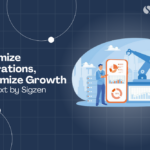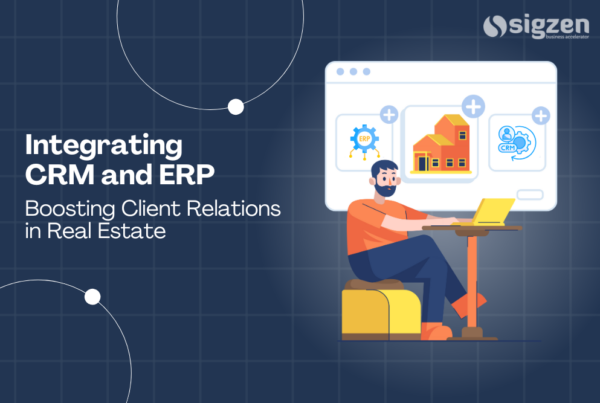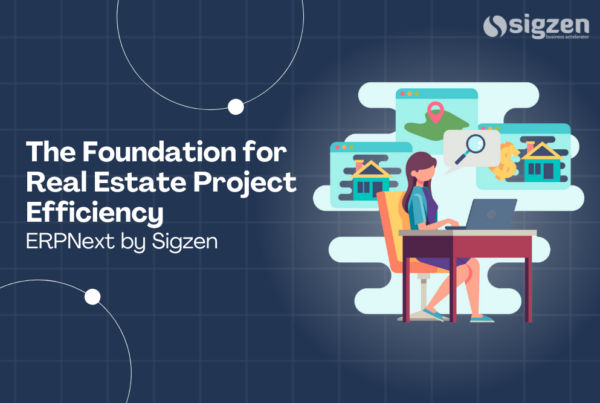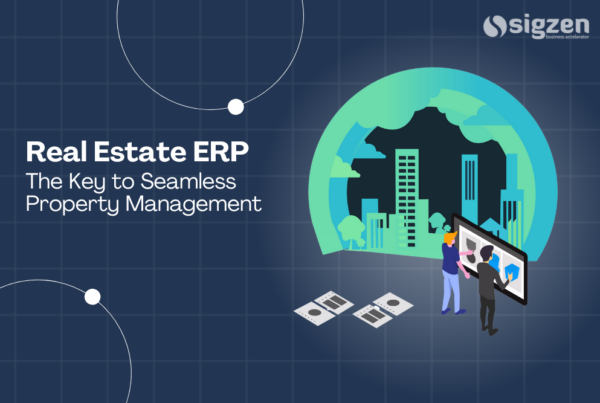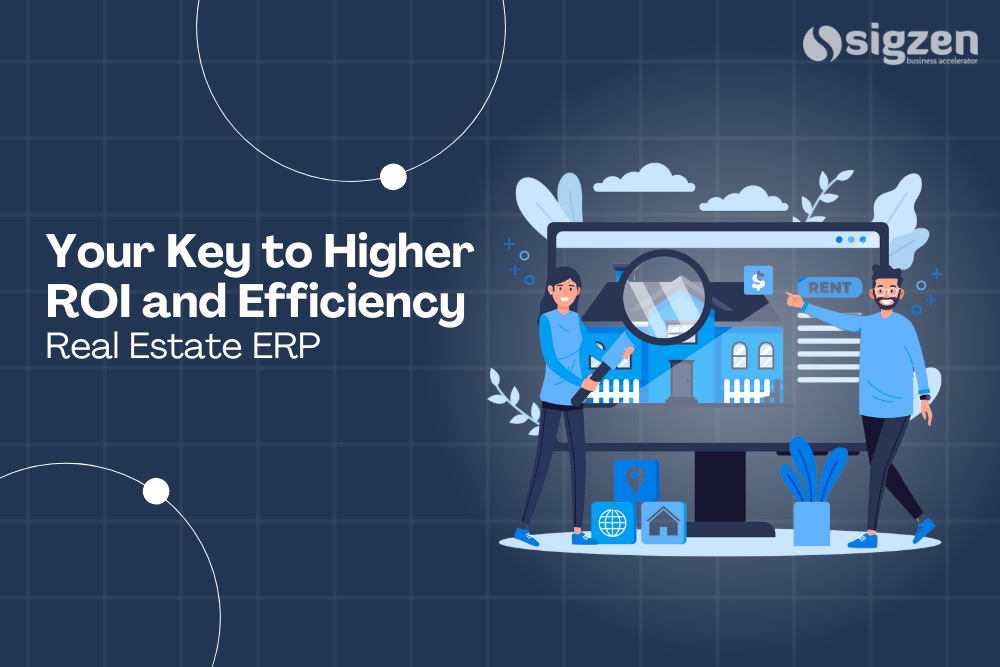
The real estate industry is no stranger to complexity. From property management and sales to tenant relations and compliance, real estate businesses juggle countless moving parts. Amidst these challenges, the adoption of ERP for Real Estate has emerged as a game-changer, delivering significant return on investment (ROI) by streamlining processes, improving decision-making, and cutting costs.
This guide explores the ROI of real estate ERP software, diving into its impact on efficiency, profitability, and scalability.
Understanding ERP for the Real Estate Industry
ERP (Enterprise Resource Planning) software integrates core business processes into a unified system. For the real estate industry, this means centralizing and automating operations such as property management, financial accounting, CRM, lease management, and project tracking.
Sigzen’s SigzenEstate ERP, built on ERPNext and the Frappe platform, is designed specifically to meet the unique needs of real estate professionals, offering modules tailored to streamline their workflows.
How ERP Software Delivers ROI in Real Estate
1. Enhanced Operational Efficiency
Manual processes can be a bottleneck, leading to errors, inefficiencies, and wasted time. ERP software automates routine tasks like lease renewals, financial reporting, and tenant communications, freeing up resources for more strategic activities.
For example, the Accounting Module in ERPNext enables real-time financial tracking, ensuring accuracy and reducing the workload for finance teams.
ROI Impact:
- Reduced administrative costs
- Faster completion of tasks
- Increased productivity
2. Improved Decision-Making
Real estate businesses generate vast amounts of data. Without a centralized system, accessing and analyzing this data can be challenging. ERP software consolidates data across departments, providing actionable insights through dashboards and reports.
With ERPNext’s Project Management Module, for instance, real estate firms can track project timelines, budgets, and progress in real time, enabling informed decision-making.
ROI Impact:
- Reduced risk of costly delays
- Better allocation of resources
- Enhanced strategic planning
3. Streamlined Financial Management
Managing finances is critical in real estate, where cash flow, property valuations, and investments play a pivotal role. ERP systems automate financial tasks like invoicing, expense tracking, and budgeting.
The Sales Cycle Module ensures seamless tracking of leads, proposals, and contracts, while the accounting module offers tools for accurate financial forecasting.
ROI Impact:
- Minimized errors in financial transactions
- Better visibility into cash flow
- Improved profitability
4. Efficient Property and Lease Management
Tracking multiple properties, tenants, and leases can be overwhelming. ERP software simplifies these tasks by automating lease renewals, generating reminders, and providing a 360-degree view of all properties.
With the Asset Management Module, real estate firms can maintain detailed records of properties, ensuring efficient upkeep and management.
ROI Impact:
- Reduced vacancy rates
- Improved tenant satisfaction
- Optimized property maintenance
5. Regulatory Compliance
The real estate industry must adhere to strict regulations, from tax compliance to tenant rights. ERP systems simplify compliance by maintaining accurate records, automating tax calculations, and generating audit-ready reports.
SigzenEstate ERP ensures compliance with both local and international regulations, reducing the risk of penalties and legal issues.
ROI Impact:
- Lower compliance costs
- Reduced legal risks
- Peace of mind
6. Scalability and Growth
As real estate businesses grow, managing operations manually becomes increasingly challenging. ERP software is scalable, allowing firms to handle larger portfolios and more complex operations without a proportional increase in costs.
SigzenEstate ERP supports multi-location and multi-currency operations, making it ideal for real estate firms with global ambitions.
ROI Impact:
- Supports business expansion
- Future-proof operations
- Cost-effective scalability
Calculating the ROI of ERP Software
Key Metrics to Consider:
- Cost Savings: Measure reductions in administrative expenses, IT overhead, and error-related costs.
- Revenue Growth: Assess increases in rental income, sales, and project profitability.
- Time Savings: Calculate time saved by automating tasks and improving efficiency.
- Compliance Benefits: Factor in savings from avoiding penalties and legal fees.
- Customer Satisfaction: Measure improvements in tenant retention and sales conversions.
Real-Life Example: ROI in Action
Case Study: A mid-sized real estate firm implementing SigzenEstate ERP achieved:
- 40% reduction in administrative costs through automation.
- 25% faster project completion rates via improved resource allocation.
- 15% increase in tenant retention by streamlining lease renewals and communications.
These improvements translated to an ROI of over 300% within the first year.
Why Choose SigzenEstate ERP?
Sigzen’s SigzenEstate ERP offers a comprehensive solution for the real estate industry. Its features include:
- Centralized property management
- Automated lease and rent tracking
- Advanced financial reporting
- Scalable architecture for growing businesses
By choosing SigzenEstate, real estate firms can unlock the full potential of ERP technology, driving efficiency, profitability, and growth.
Conclusion: Maximizing ROI with Real Estate ERP Software
Investing in an ERP for the real estate industry is more than a technological upgrade—it’s a strategic move toward operational excellence and profitability. From automating tasks to enhancing decision-making, ERP systems deliver measurable ROI by addressing the unique challenges of real estate businesses.
If you’re ready to transform your operations, explore SigzenEstate ERP and request a demo today.
